Of great significance for university shielding policies: even taking health conditions into account "the biggest influence on a persons COVID-19 risk is age. The risk from age is actually an extraordinarily accelerating one (log-linear...)." 1/ Source:
https://voxeu.org/article/covid-19-pandemic-causing-crisis-uk-universities-0">https://voxeu.org/article/c...
https://voxeu.org/article/covid-19-pandemic-causing-crisis-uk-universities-0">https://voxeu.org/article/c...
If this is right, the government will need to accord greater significant to age as a Covid-19 risk factor than is indicated on these lists https://abs.twimg.com/emoji/v2/... draggable="false" alt="👇" title="Rückhand Zeigefinger nach unten" aria-label="Emoji: Rückhand Zeigefinger nach unten">. 2/ https://www.nhs.uk/conditions/coronavirus-covid-19/people-at-higher-risk/whos-at-higher-risk-from-coronavirus/">https://www.nhs.uk/condition...
https://abs.twimg.com/emoji/v2/... draggable="false" alt="👇" title="Rückhand Zeigefinger nach unten" aria-label="Emoji: Rückhand Zeigefinger nach unten">. 2/ https://www.nhs.uk/conditions/coronavirus-covid-19/people-at-higher-risk/whos-at-higher-risk-from-coronavirus/">https://www.nhs.uk/condition...
I recently posted the following PHE analysis of age as a Covid-19 risk factor https://abs.twimg.com/emoji/v2/... draggable="false" alt="👇" title="Rückhand Zeigefinger nach unten" aria-label="Emoji: Rückhand Zeigefinger nach unten">. 3/ https://twitter.com/MikeOtsuka/status/1268063605037174785">https://twitter.com/MikeOtsuk...
https://abs.twimg.com/emoji/v2/... draggable="false" alt="👇" title="Rückhand Zeigefinger nach unten" aria-label="Emoji: Rückhand Zeigefinger nach unten">. 3/ https://twitter.com/MikeOtsuka/status/1268063605037174785">https://twitter.com/MikeOtsuk...
According to the analysis discussed in 1/, however, age is a Covid-19 risk factor above & beyond, & of greater significance than, various oft-cited health conditions associated with age. 5/
University employers will need to take full account of these findings, in order to ensure compliance with the following recently-issued government guidance https://abs.twimg.com/emoji/v2/... draggable="false" alt="👇" title="Rückhand Zeigefinger nach unten" aria-label="Emoji: Rückhand Zeigefinger nach unten">. 6/6
https://abs.twimg.com/emoji/v2/... draggable="false" alt="👇" title="Rückhand Zeigefinger nach unten" aria-label="Emoji: Rückhand Zeigefinger nach unten">. 6/6
https://www.gov.uk/government/publications/higher-education-reopening-buildings-and-campuses/higher-education-reopening-buildings-and-campuses">https://www.gov.uk/governmen...
https://www.gov.uk/government/publications/higher-education-reopening-buildings-and-campuses/higher-education-reopening-buildings-and-campuses">https://www.gov.uk/governmen...
According to this webpage https://abs.twimg.com/emoji/v2/... draggable="false" alt="👇" title="Rückhand Zeigefinger nach unten" aria-label="Emoji: Rückhand Zeigefinger nach unten">, the NHS& #39;s current list of those who are "at risk" of Covid-19 is, at present, simply a carrying over of their existing list of those who are deemed clinically vulnerable to influenza. 1/ https://digital.nhs.uk/coronavirus/shielded-patient-list/methodology/background">https://digital.nhs.uk/coronavir...
https://abs.twimg.com/emoji/v2/... draggable="false" alt="👇" title="Rückhand Zeigefinger nach unten" aria-label="Emoji: Rückhand Zeigefinger nach unten">, the NHS& #39;s current list of those who are "at risk" of Covid-19 is, at present, simply a carrying over of their existing list of those who are deemed clinically vulnerable to influenza. 1/ https://digital.nhs.uk/coronavirus/shielded-patient-list/methodology/background">https://digital.nhs.uk/coronavir...
It might make sense, in the case of flu, to set the & #39;at risk& #39; age threshold at 70. It appears, however, that the & #39;at risk& #39; age threshold should be much lower in the case of Covid-19. 2/
The study discussed in the tweet at top of this thread provides adjusted [to hold other things equal] hazard ratios (aHR) of how much more likely a Covid-19 infected person is to die if that person has various conditions that put one on the NHS& #39;s & #39;at risk& #39; list. 3/
Very obese (greater than 40 bmi)=2.27 aHR (=2.27 times more likely to die than if not obese at all)
Respiratory disease (other than asthma, which is less of a risk factor)=1.78 aHR
Uncontrolled diabetes=2.36 aHR
Chronic heart disease=1.27 aHR
Kidney disease=1.72 aHR 4/
Respiratory disease (other than asthma, which is less of a risk factor)=1.78 aHR
Uncontrolled diabetes=2.36 aHR
Chronic heart disease=1.27 aHR
Kidney disease=1.72 aHR 4/
Liver disease=1.61 aHR
Neurological (apart from stroke/dementia which is less of a risk factor)=2.46 aHR
Immunosuppressive condition=1.69 aHR 5/
Neurological (apart from stroke/dementia which is less of a risk factor)=2.46 aHR
Immunosuppressive condition=1.69 aHR 5/
Being over 70 is the age-based risk factor that places one on the same NHS Covid-19 & #39;at risk& #39; list as above conditions. 6/
But, in contrast to the above, the aHR of a 70-80 yr old& #39;s dying of Covid-19 infection is 68 times greater than the risk if one is below the UK median population age of 40. 7/
70-80 yr old is 15 times more likely to die than 40-50 yr old. You don& #39;t even want to hear about the hazard ratios for being over 80. 8/
So age is off the charts compared with the other conditions that qualify one as & #39;at risk& #39; (clinically vulnerable). 9/
The NHS& #39;s current list of & #39;Who& #39;s at higher risk from coronavirus& #39; contains the following health warning https://abs.twimg.com/emoji/v2/... draggable="false" alt="👇" title="Rückhand Zeigefinger nach unten" aria-label="Emoji: Rückhand Zeigefinger nach unten">. 10/
https://abs.twimg.com/emoji/v2/... draggable="false" alt="👇" title="Rückhand Zeigefinger nach unten" aria-label="Emoji: Rückhand Zeigefinger nach unten">. 10/
If @UniversitiesUK simply apply the current NHS list to designate staff & students at higher risk, they will be relying on a list that applies to influenza and has not been updated to capture the specifics of Covid-19. 11/
If they rely on this influenza list, this would not be the first time the UK got things badly wrong by misapplying an influenza frame to Covid-19. Cf https://abs.twimg.com/emoji/v2/... draggable="false" alt="👇" title="Rückhand Zeigefinger nach unten" aria-label="Emoji: Rückhand Zeigefinger nach unten">New Zealand. 12/12 https://twitter.com/MikeOtsuka/status/1270606095103467521">https://twitter.com/MikeOtsuk...
https://abs.twimg.com/emoji/v2/... draggable="false" alt="👇" title="Rückhand Zeigefinger nach unten" aria-label="Emoji: Rückhand Zeigefinger nach unten">New Zealand. 12/12 https://twitter.com/MikeOtsuka/status/1270606095103467521">https://twitter.com/MikeOtsuk...
PS: An infected 40-50 yr old is 4.4 times more likely to die of a Covid-19 infection than someone under 40. So being 40-50 already has a greater aHR than the various medical conditions sufficent to place one on the NHS& #39;s & #39;at risk& #39; list. 1/
And a coronavirus-infected 50-60 yr old is 14 times more likely to die than someone under 40. A far greater aHR than the medical conditions which place one on the current NHS coronavirus & #39;at risk& #39; list. 2/2
As noted above, the 70 yr old threshold for & #39;at risk& #39; clinical vulnerability to Covid-19 is an unrevised application of NHS criteria of clinical vulnerability to influenza. 1/
But https://abs.twimg.com/emoji/v2/... draggable="false" alt="👇" title="Rückhand Zeigefinger nach unten" aria-label="Emoji: Rückhand Zeigefinger nach unten">indicates that a 50-59 yr old has a significantly greater risk of dying of Covid-19 than a 65+ yr old has of dying of influenza, providing evidence that the age threshold for clinical vulnerable to Covid-19 should be lowered to at least 50. 2/2
https://abs.twimg.com/emoji/v2/... draggable="false" alt="👇" title="Rückhand Zeigefinger nach unten" aria-label="Emoji: Rückhand Zeigefinger nach unten">indicates that a 50-59 yr old has a significantly greater risk of dying of Covid-19 than a 65+ yr old has of dying of influenza, providing evidence that the age threshold for clinical vulnerable to Covid-19 should be lowered to at least 50. 2/2
https://www.vox.com/science-and-health/2020/3/13/21176735/covid-19-coronavirus-worse-than-flu-comparison">https://www.vox.com/science-a...
https://www.vox.com/science-and-health/2020/3/13/21176735/covid-19-coronavirus-worse-than-flu-comparison">https://www.vox.com/science-a...
Link to transcript of Hancock& #39;s statement: https://www.gov.uk/government/speeches/health-and-social-care-secretarys-statement-on-coronavirus-covid-19-18-june-2020">https://www.gov.uk/governmen...
Link https://abs.twimg.com/emoji/v2/... draggable="false" alt="👇" title="Rückhand Zeigefinger nach unten" aria-label="Emoji: Rückhand Zeigefinger nach unten">to report to which Hancock refers, which states that "Current evidence strongly indicates that the risk of serious disease and death increases with age and is increased in those with a number of underlying health conditions". Report also says this
https://abs.twimg.com/emoji/v2/... draggable="false" alt="👇" title="Rückhand Zeigefinger nach unten" aria-label="Emoji: Rückhand Zeigefinger nach unten">to report to which Hancock refers, which states that "Current evidence strongly indicates that the risk of serious disease and death increases with age and is increased in those with a number of underlying health conditions". Report also says this https://abs.twimg.com/emoji/v2/... draggable="false" alt="👇" title="Rückhand Zeigefinger nach unten" aria-label="Emoji: Rückhand Zeigefinger nach unten">.
https://abs.twimg.com/emoji/v2/... draggable="false" alt="👇" title="Rückhand Zeigefinger nach unten" aria-label="Emoji: Rückhand Zeigefinger nach unten">.
https://www.gov.uk/government/publications/priority-groups-for-coronavirus-covid-19-vaccination-advice-from-the-jcvi/interim-advice-on-priority-groups-for-covid-19-vaccination">https://www.gov.uk/governmen...
https://www.gov.uk/government/publications/priority-groups-for-coronavirus-covid-19-vaccination-advice-from-the-jcvi/interim-advice-on-priority-groups-for-covid-19-vaccination">https://www.gov.uk/governmen...
Note that https://abs.twimg.com/emoji/v2/... draggable="false" alt="👆" title="Rückhand Zeigefinger nach oben" aria-label="Emoji: Rückhand Zeigefinger nach oben">speaks of "greatest risk of SEVERE ILLNESS and mortality". Even if the risk of death is relatively low, the risk of severe illness short of death is much higher. About 1 in 20 with symptoms remain ill for longer than a month.
https://abs.twimg.com/emoji/v2/... draggable="false" alt="👆" title="Rückhand Zeigefinger nach oben" aria-label="Emoji: Rückhand Zeigefinger nach oben">speaks of "greatest risk of SEVERE ILLNESS and mortality". Even if the risk of death is relatively low, the risk of severe illness short of death is much higher. About 1 in 20 with symptoms remain ill for longer than a month. https://abs.twimg.com/emoji/v2/... draggable="false" alt="👇" title="Rückhand Zeigefinger nach unten" aria-label="Emoji: Rückhand Zeigefinger nach unten"> https://www.ft.com/content/91e4482e-d120-49ab-93e3-d314d99b5336">https://www.ft.com/content/9...
https://abs.twimg.com/emoji/v2/... draggable="false" alt="👇" title="Rückhand Zeigefinger nach unten" aria-label="Emoji: Rückhand Zeigefinger nach unten"> https://www.ft.com/content/91e4482e-d120-49ab-93e3-d314d99b5336">https://www.ft.com/content/9...
See https://abs.twimg.com/emoji/v2/... draggable="false" alt="👇" title="Rückhand Zeigefinger nach unten" aria-label="Emoji: Rückhand Zeigefinger nach unten">from @p_openshaw on the long-term effects of Covid-19.
https://abs.twimg.com/emoji/v2/... draggable="false" alt="👇" title="Rückhand Zeigefinger nach unten" aria-label="Emoji: Rückhand Zeigefinger nach unten">from @p_openshaw on the long-term effects of Covid-19.
Moreover, there is evidence of lung damage among a fairly large proportion of those 30% who are infected but don& #39;t realise it because they remain asymptomatic. https://twitter.com/EricTopol/status/1272220863639609344">https://twitter.com/EricTopol...
So there are compelling reasons beyond chance of death for those at elevated risk of coronavirus to take considerable measures to avoid infection. Any @UniversitiesUK risk assessment will need to fully account for these harms short of death.
https://www.cdc.gov/media/releases/2020/p0625-update-expands-covid-19.html">https://www.cdc.gov/media/rel...
. @CDCgov https://abs.twimg.com/emoji/v2/... draggable="false" alt="👆" title="Rückhand Zeigefinger nach oben" aria-label="Emoji: Rückhand Zeigefinger nach oben">also maintains that "Age is an INDEPENDENT risk factor for severe illness, but risk in older adults is also in part related to the increased likelihood that older adults also have underlying medical conditions". 2/
https://abs.twimg.com/emoji/v2/... draggable="false" alt="👆" title="Rückhand Zeigefinger nach oben" aria-label="Emoji: Rückhand Zeigefinger nach oben">also maintains that "Age is an INDEPENDENT risk factor for severe illness, but risk in older adults is also in part related to the increased likelihood that older adults also have underlying medical conditions". 2/
. @CDCgov now says the following about "Older Adults" under the general heading of "People Who Are at Increased Risk for Severe Illness" https://abs.twimg.com/emoji/v2/... draggable="false" alt="👇" title="Rückhand Zeigefinger nach unten" aria-label="Emoji: Rückhand Zeigefinger nach unten">. 3/3
https://abs.twimg.com/emoji/v2/... draggable="false" alt="👇" title="Rückhand Zeigefinger nach unten" aria-label="Emoji: Rückhand Zeigefinger nach unten">. 3/3
https://www.cdc.gov/coronavirus/2019-ncov/need-extra-precautions/older-adults.html">https://www.cdc.gov/coronavir...
https://www.cdc.gov/coronavirus/2019-ncov/need-extra-precautions/older-adults.html">https://www.cdc.gov/coronavir...
Covid-19 may impair the immune system, leading to a depletion of T cells, w "eerie parallels with H.I.V" https://abs.twimg.com/emoji/v2/... draggable="false" alt="👇" title="Rückhand Zeigefinger nach unten" aria-label="Emoji: Rückhand Zeigefinger nach unten">. Such impairment would explain why risk increases so dramatically w age & why children are at low risk.
https://abs.twimg.com/emoji/v2/... draggable="false" alt="👇" title="Rückhand Zeigefinger nach unten" aria-label="Emoji: Rückhand Zeigefinger nach unten">. Such impairment would explain why risk increases so dramatically w age & why children are at low risk.
https://www.nytimes.com/2020/06/26/health/coronavirus-immune-system.html">https://www.nytimes.com/2020/06/2...
https://www.nytimes.com/2020/06/26/health/coronavirus-immune-system.html">https://www.nytimes.com/2020/06/2...
A question for @MattHancock https://abs.twimg.com/emoji/v2/... draggable="false" alt="👇" title="Rückhand Zeigefinger nach unten" aria-label="Emoji: Rückhand Zeigefinger nach unten">. https://twitter.com/MikeOtsuka/status/1278215561193889792">https://twitter.com/MikeOtsuk...
https://abs.twimg.com/emoji/v2/... draggable="false" alt="👇" title="Rückhand Zeigefinger nach unten" aria-label="Emoji: Rückhand Zeigefinger nach unten">. https://twitter.com/MikeOtsuka/status/1278215561193889792">https://twitter.com/MikeOtsuk...
A newer version of the OpenSAFELY study I discuss in the tweet at the top of this thread has just been published in Nature https://abs.twimg.com/emoji/v2/... draggable="false" alt="👇" title="Rückhand Zeigefinger nach unten" aria-label="Emoji: Rückhand Zeigefinger nach unten">. It draws on ONS data on suspected Covid-19 deaths outside of hospitals as well as Covid deaths in hospital. 1/
https://abs.twimg.com/emoji/v2/... draggable="false" alt="👇" title="Rückhand Zeigefinger nach unten" aria-label="Emoji: Rückhand Zeigefinger nach unten">. It draws on ONS data on suspected Covid-19 deaths outside of hospitals as well as Covid deaths in hospital. 1/
https://nature.com/articles/s41586-020-2521-4_reference.pdf">https://nature.com/articles/...
https://nature.com/articles/s41586-020-2521-4_reference.pdf">https://nature.com/articles/...
In the Nature version, the effect of age in increasing risk is even greater, in comparison with the effects of health conditions, thereby reinforcing the points I make in this thread. 2/2

 Read on Twitter
Read on Twitter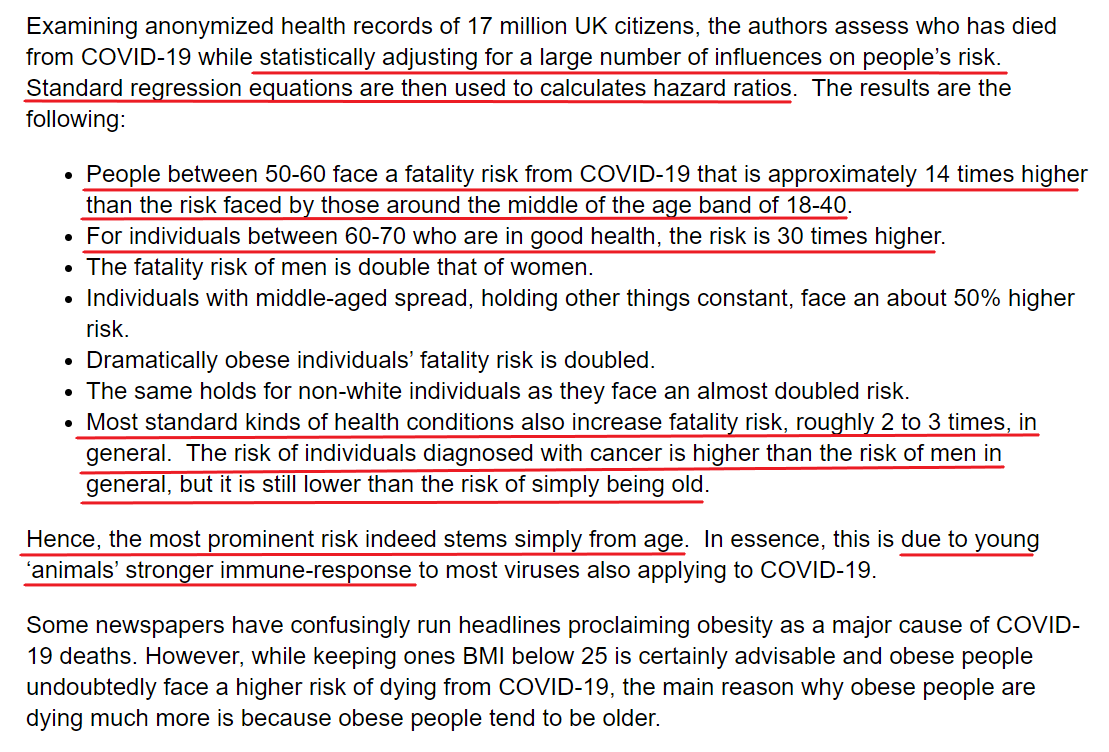
 . 6/6 https://www.gov.uk/governmen..." title="University employers will need to take full account of these findings, in order to ensure compliance with the following recently-issued government guidancehttps://abs.twimg.com/emoji/v2/... draggable="false" alt="👇" title="Rückhand Zeigefinger nach unten" aria-label="Emoji: Rückhand Zeigefinger nach unten">. 6/6 https://www.gov.uk/governmen..." class="img-responsive" style="max-width:100%;"/>
. 6/6 https://www.gov.uk/governmen..." title="University employers will need to take full account of these findings, in order to ensure compliance with the following recently-issued government guidancehttps://abs.twimg.com/emoji/v2/... draggable="false" alt="👇" title="Rückhand Zeigefinger nach unten" aria-label="Emoji: Rückhand Zeigefinger nach unten">. 6/6 https://www.gov.uk/governmen..." class="img-responsive" style="max-width:100%;"/>
 . 10/" title="The NHS& #39;s current list of & #39;Who& #39;s at higher risk from coronavirus& #39; contains the following health warninghttps://abs.twimg.com/emoji/v2/... draggable="false" alt="👇" title="Rückhand Zeigefinger nach unten" aria-label="Emoji: Rückhand Zeigefinger nach unten">. 10/" class="img-responsive" style="max-width:100%;"/>
. 10/" title="The NHS& #39;s current list of & #39;Who& #39;s at higher risk from coronavirus& #39; contains the following health warninghttps://abs.twimg.com/emoji/v2/... draggable="false" alt="👇" title="Rückhand Zeigefinger nach unten" aria-label="Emoji: Rückhand Zeigefinger nach unten">. 10/" class="img-responsive" style="max-width:100%;"/>
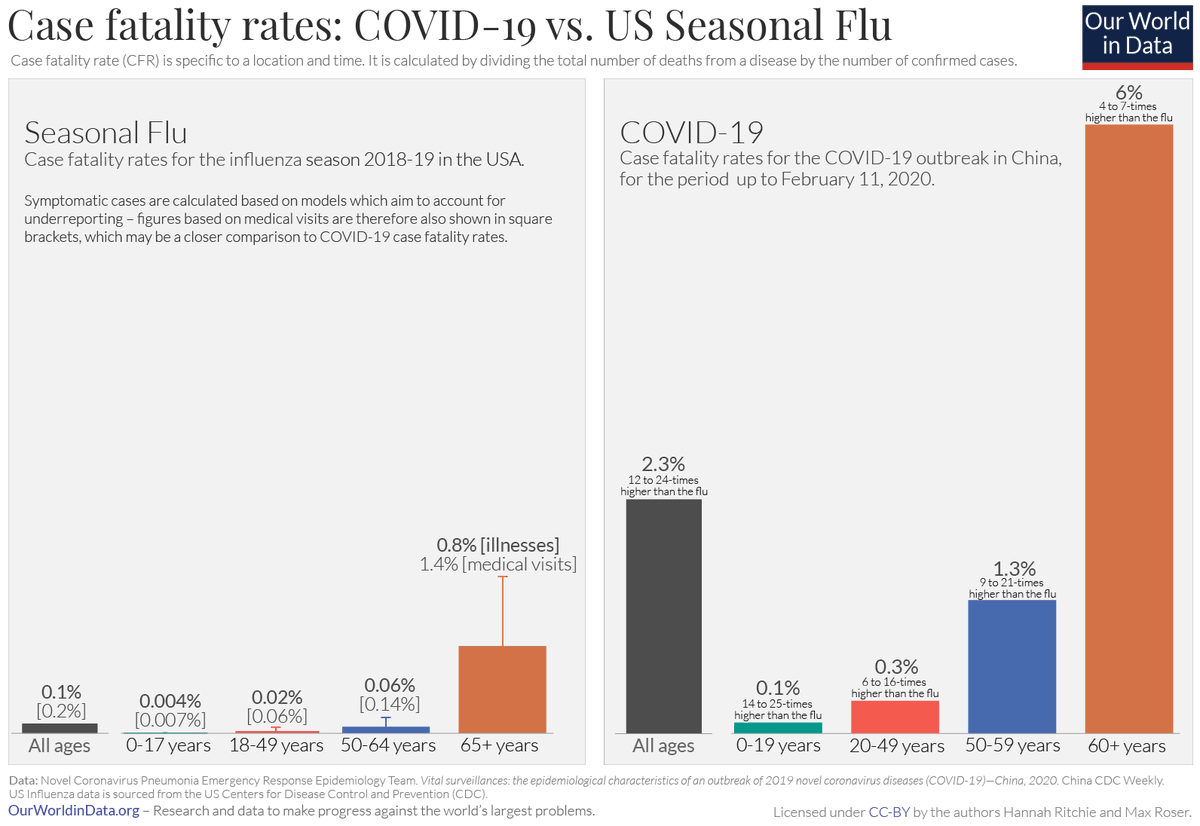 indicates that a 50-59 yr old has a significantly greater risk of dying of Covid-19 than a 65+ yr old has of dying of influenza, providing evidence that the age threshold for clinical vulnerable to Covid-19 should be lowered to at least 50. 2/2 https://www.vox.com/science-a..." title="Buthttps://abs.twimg.com/emoji/v2/... draggable="false" alt="👇" title="Rückhand Zeigefinger nach unten" aria-label="Emoji: Rückhand Zeigefinger nach unten">indicates that a 50-59 yr old has a significantly greater risk of dying of Covid-19 than a 65+ yr old has of dying of influenza, providing evidence that the age threshold for clinical vulnerable to Covid-19 should be lowered to at least 50. 2/2 https://www.vox.com/science-a..." class="img-responsive" style="max-width:100%;"/>
indicates that a 50-59 yr old has a significantly greater risk of dying of Covid-19 than a 65+ yr old has of dying of influenza, providing evidence that the age threshold for clinical vulnerable to Covid-19 should be lowered to at least 50. 2/2 https://www.vox.com/science-a..." title="Buthttps://abs.twimg.com/emoji/v2/... draggable="false" alt="👇" title="Rückhand Zeigefinger nach unten" aria-label="Emoji: Rückhand Zeigefinger nach unten">indicates that a 50-59 yr old has a significantly greater risk of dying of Covid-19 than a 65+ yr old has of dying of influenza, providing evidence that the age threshold for clinical vulnerable to Covid-19 should be lowered to at least 50. 2/2 https://www.vox.com/science-a..." class="img-responsive" style="max-width:100%;"/>
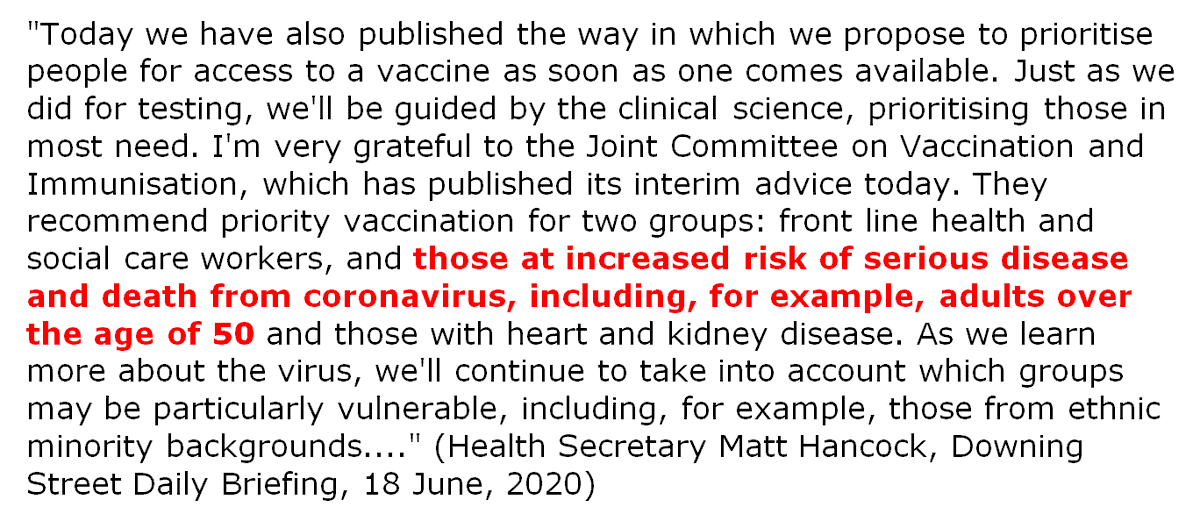 https://abs.twimg.com/emoji/v2/... draggable="false" alt="🚨" title="Polizeiautos mit drehendem Licht" aria-label="Emoji: Polizeiautos mit drehendem Licht">https://abs.twimg.com/emoji/v2/... draggable="false" alt="🚨" title="Polizeiautos mit drehendem Licht" aria-label="Emoji: Polizeiautos mit drehendem Licht">Health Secretary Matt Hancock has just declared, in the daily press briefing, that "those at increased risk of serious disease and death from coronavirus" include "adults over the age of 50". Fuller statementhttps://abs.twimg.com/emoji/v2/... draggable="false" alt="👇" title="Rückhand Zeigefinger nach unten" aria-label="Emoji: Rückhand Zeigefinger nach unten">." title="https://abs.twimg.com/emoji/v2/... draggable="false" alt="🚨" title="Polizeiautos mit drehendem Licht" aria-label="Emoji: Polizeiautos mit drehendem Licht">https://abs.twimg.com/emoji/v2/... draggable="false" alt="🚨" title="Polizeiautos mit drehendem Licht" aria-label="Emoji: Polizeiautos mit drehendem Licht">https://abs.twimg.com/emoji/v2/... draggable="false" alt="🚨" title="Polizeiautos mit drehendem Licht" aria-label="Emoji: Polizeiautos mit drehendem Licht">Health Secretary Matt Hancock has just declared, in the daily press briefing, that "those at increased risk of serious disease and death from coronavirus" include "adults over the age of 50". Fuller statementhttps://abs.twimg.com/emoji/v2/... draggable="false" alt="👇" title="Rückhand Zeigefinger nach unten" aria-label="Emoji: Rückhand Zeigefinger nach unten">." class="img-responsive" style="max-width:100%;"/>
https://abs.twimg.com/emoji/v2/... draggable="false" alt="🚨" title="Polizeiautos mit drehendem Licht" aria-label="Emoji: Polizeiautos mit drehendem Licht">https://abs.twimg.com/emoji/v2/... draggable="false" alt="🚨" title="Polizeiautos mit drehendem Licht" aria-label="Emoji: Polizeiautos mit drehendem Licht">Health Secretary Matt Hancock has just declared, in the daily press briefing, that "those at increased risk of serious disease and death from coronavirus" include "adults over the age of 50". Fuller statementhttps://abs.twimg.com/emoji/v2/... draggable="false" alt="👇" title="Rückhand Zeigefinger nach unten" aria-label="Emoji: Rückhand Zeigefinger nach unten">." title="https://abs.twimg.com/emoji/v2/... draggable="false" alt="🚨" title="Polizeiautos mit drehendem Licht" aria-label="Emoji: Polizeiautos mit drehendem Licht">https://abs.twimg.com/emoji/v2/... draggable="false" alt="🚨" title="Polizeiautos mit drehendem Licht" aria-label="Emoji: Polizeiautos mit drehendem Licht">https://abs.twimg.com/emoji/v2/... draggable="false" alt="🚨" title="Polizeiautos mit drehendem Licht" aria-label="Emoji: Polizeiautos mit drehendem Licht">Health Secretary Matt Hancock has just declared, in the daily press briefing, that "those at increased risk of serious disease and death from coronavirus" include "adults over the age of 50". Fuller statementhttps://abs.twimg.com/emoji/v2/... draggable="false" alt="👇" title="Rückhand Zeigefinger nach unten" aria-label="Emoji: Rückhand Zeigefinger nach unten">." class="img-responsive" style="max-width:100%;"/>
 to report to which Hancock refers, which states that "Current evidence strongly indicates that the risk of serious disease and death increases with age and is increased in those with a number of underlying health conditions". Report also says thishttps://abs.twimg.com/emoji/v2/... draggable="false" alt="👇" title="Rückhand Zeigefinger nach unten" aria-label="Emoji: Rückhand Zeigefinger nach unten">. https://www.gov.uk/governmen..." title="Linkhttps://abs.twimg.com/emoji/v2/... draggable="false" alt="👇" title="Rückhand Zeigefinger nach unten" aria-label="Emoji: Rückhand Zeigefinger nach unten">to report to which Hancock refers, which states that "Current evidence strongly indicates that the risk of serious disease and death increases with age and is increased in those with a number of underlying health conditions". Report also says thishttps://abs.twimg.com/emoji/v2/... draggable="false" alt="👇" title="Rückhand Zeigefinger nach unten" aria-label="Emoji: Rückhand Zeigefinger nach unten">. https://www.gov.uk/governmen..." class="img-responsive" style="max-width:100%;"/>
to report to which Hancock refers, which states that "Current evidence strongly indicates that the risk of serious disease and death increases with age and is increased in those with a number of underlying health conditions". Report also says thishttps://abs.twimg.com/emoji/v2/... draggable="false" alt="👇" title="Rückhand Zeigefinger nach unten" aria-label="Emoji: Rückhand Zeigefinger nach unten">. https://www.gov.uk/governmen..." title="Linkhttps://abs.twimg.com/emoji/v2/... draggable="false" alt="👇" title="Rückhand Zeigefinger nach unten" aria-label="Emoji: Rückhand Zeigefinger nach unten">to report to which Hancock refers, which states that "Current evidence strongly indicates that the risk of serious disease and death increases with age and is increased in those with a number of underlying health conditions". Report also says thishttps://abs.twimg.com/emoji/v2/... draggable="false" alt="👇" title="Rückhand Zeigefinger nach unten" aria-label="Emoji: Rückhand Zeigefinger nach unten">. https://www.gov.uk/governmen..." class="img-responsive" style="max-width:100%;"/>
 from @p_openshaw on the long-term effects of Covid-19." title="Seehttps://abs.twimg.com/emoji/v2/... draggable="false" alt="👇" title="Rückhand Zeigefinger nach unten" aria-label="Emoji: Rückhand Zeigefinger nach unten">from @p_openshaw on the long-term effects of Covid-19." class="img-responsive" style="max-width:100%;"/>
from @p_openshaw on the long-term effects of Covid-19." title="Seehttps://abs.twimg.com/emoji/v2/... draggable="false" alt="👇" title="Rückhand Zeigefinger nach unten" aria-label="Emoji: Rückhand Zeigefinger nach unten">from @p_openshaw on the long-term effects of Covid-19." class="img-responsive" style="max-width:100%;"/>
 . @CDCgov has now "removed the specific age threshold" of 65. "CDC now warns that among adults, risk increases steadily as you age, and it& #39;s not just those over the age of 65 who are at increased risk for severe illness" from Covid-19 infection.https://abs.twimg.com/emoji/v2/... draggable="false" alt="👇" title="Rückhand Zeigefinger nach unten" aria-label="Emoji: Rückhand Zeigefinger nach unten">1/ https://www.cdc.gov/media/rel..." title="https://abs.twimg.com/emoji/v2/... draggable="false" alt="🚨" title="Polizeiautos mit drehendem Licht" aria-label="Emoji: Polizeiautos mit drehendem Licht">. @CDCgov has now "removed the specific age threshold" of 65. "CDC now warns that among adults, risk increases steadily as you age, and it& #39;s not just those over the age of 65 who are at increased risk for severe illness" from Covid-19 infection.https://abs.twimg.com/emoji/v2/... draggable="false" alt="👇" title="Rückhand Zeigefinger nach unten" aria-label="Emoji: Rückhand Zeigefinger nach unten">1/ https://www.cdc.gov/media/rel..." class="img-responsive" style="max-width:100%;"/>
. @CDCgov has now "removed the specific age threshold" of 65. "CDC now warns that among adults, risk increases steadily as you age, and it& #39;s not just those over the age of 65 who are at increased risk for severe illness" from Covid-19 infection.https://abs.twimg.com/emoji/v2/... draggable="false" alt="👇" title="Rückhand Zeigefinger nach unten" aria-label="Emoji: Rückhand Zeigefinger nach unten">1/ https://www.cdc.gov/media/rel..." title="https://abs.twimg.com/emoji/v2/... draggable="false" alt="🚨" title="Polizeiautos mit drehendem Licht" aria-label="Emoji: Polizeiautos mit drehendem Licht">. @CDCgov has now "removed the specific age threshold" of 65. "CDC now warns that among adults, risk increases steadily as you age, and it& #39;s not just those over the age of 65 who are at increased risk for severe illness" from Covid-19 infection.https://abs.twimg.com/emoji/v2/... draggable="false" alt="👇" title="Rückhand Zeigefinger nach unten" aria-label="Emoji: Rückhand Zeigefinger nach unten">1/ https://www.cdc.gov/media/rel..." class="img-responsive" style="max-width:100%;"/>
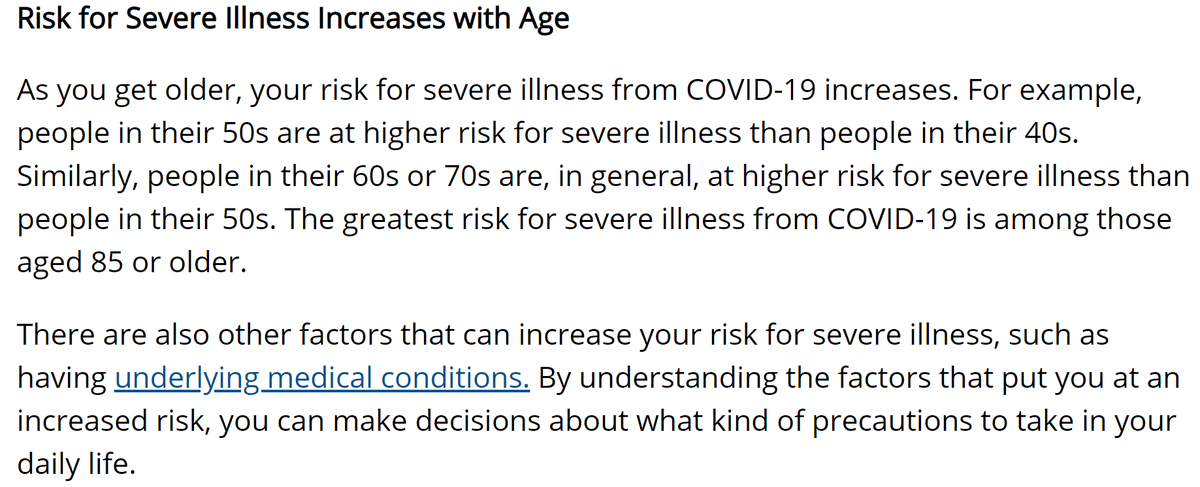 . 3/3 https://www.cdc.gov/coronavir..." title=". @CDCgov now says the following about "Older Adults" under the general heading of "People Who Are at Increased Risk for Severe Illness"https://abs.twimg.com/emoji/v2/... draggable="false" alt="👇" title="Rückhand Zeigefinger nach unten" aria-label="Emoji: Rückhand Zeigefinger nach unten">. 3/3 https://www.cdc.gov/coronavir..." class="img-responsive" style="max-width:100%;"/>
. 3/3 https://www.cdc.gov/coronavir..." title=". @CDCgov now says the following about "Older Adults" under the general heading of "People Who Are at Increased Risk for Severe Illness"https://abs.twimg.com/emoji/v2/... draggable="false" alt="👇" title="Rückhand Zeigefinger nach unten" aria-label="Emoji: Rückhand Zeigefinger nach unten">. 3/3 https://www.cdc.gov/coronavir..." class="img-responsive" style="max-width:100%;"/>
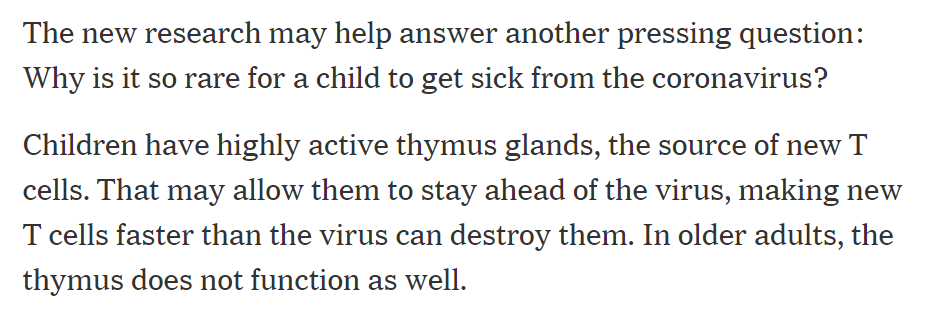 . Such impairment would explain why risk increases so dramatically w age & why children are at low risk. https://www.nytimes.com/2020/06/2..." title="Covid-19 may impair the immune system, leading to a depletion of T cells, w "eerie parallels with H.I.V"https://abs.twimg.com/emoji/v2/... draggable="false" alt="👇" title="Rückhand Zeigefinger nach unten" aria-label="Emoji: Rückhand Zeigefinger nach unten">. Such impairment would explain why risk increases so dramatically w age & why children are at low risk. https://www.nytimes.com/2020/06/2...">
. Such impairment would explain why risk increases so dramatically w age & why children are at low risk. https://www.nytimes.com/2020/06/2..." title="Covid-19 may impair the immune system, leading to a depletion of T cells, w "eerie parallels with H.I.V"https://abs.twimg.com/emoji/v2/... draggable="false" alt="👇" title="Rückhand Zeigefinger nach unten" aria-label="Emoji: Rückhand Zeigefinger nach unten">. Such impairment would explain why risk increases so dramatically w age & why children are at low risk. https://www.nytimes.com/2020/06/2...">
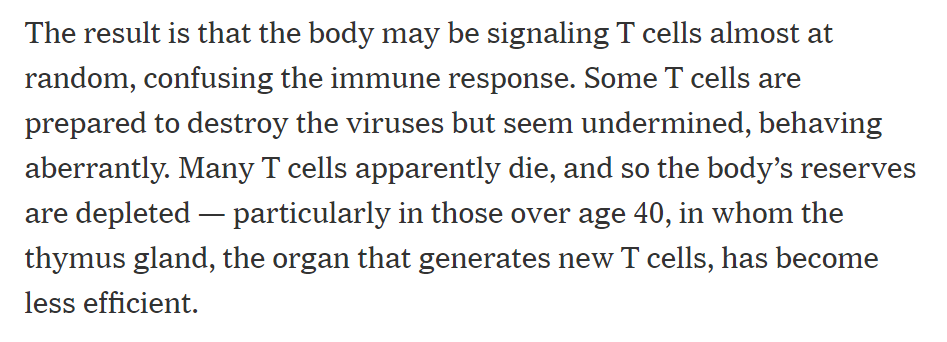 . Such impairment would explain why risk increases so dramatically w age & why children are at low risk. https://www.nytimes.com/2020/06/2..." title="Covid-19 may impair the immune system, leading to a depletion of T cells, w "eerie parallels with H.I.V"https://abs.twimg.com/emoji/v2/... draggable="false" alt="👇" title="Rückhand Zeigefinger nach unten" aria-label="Emoji: Rückhand Zeigefinger nach unten">. Such impairment would explain why risk increases so dramatically w age & why children are at low risk. https://www.nytimes.com/2020/06/2...">
. Such impairment would explain why risk increases so dramatically w age & why children are at low risk. https://www.nytimes.com/2020/06/2..." title="Covid-19 may impair the immune system, leading to a depletion of T cells, w "eerie parallels with H.I.V"https://abs.twimg.com/emoji/v2/... draggable="false" alt="👇" title="Rückhand Zeigefinger nach unten" aria-label="Emoji: Rückhand Zeigefinger nach unten">. Such impairment would explain why risk increases so dramatically w age & why children are at low risk. https://www.nytimes.com/2020/06/2...">


